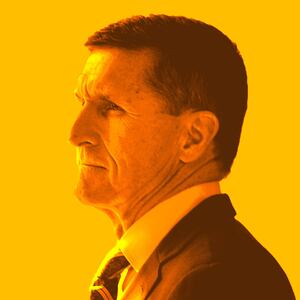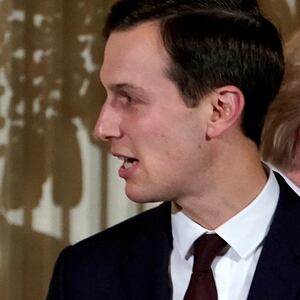The Trump administration is still actively working to make a deal to send U.S. nuclear technology to Saudi Arabia, according to two U.S. officials and two professional staffers at federal agencies with direct knowledge of those conversations. American energy businesses are still hoping to cash in on Riyadh’s push for energy diversification.
“This could be a very big contract. This administration is all about contracts,” said Hussein Ibish, a resident scholar at the Arab Gulf States Institute in Washington. “And there is a big market here that U.S. companies can get in on. The question is if the U.S. will decide, in the end, to go through with an official agreement or not.”
During the first few months of President Trump’s administration, members of his team tried to pull together a nuclear export deal that included private U.S. companies, according to three people with direct knowledge of those efforts and a congressional report issued in late February.
That pursuit raised concerns at the time among professional staff inside the Departments of Energy, State, and Commerce. Those worries grew as it became clear that members of the administration had not engaged in regulatory and legal conversations about the export of such technology. Worse, the nuclear export plan was, in essence, the work of a single company. The firm, IP3, was connected to a pack of former generals, including then-National Security Adviser Michael Flynn and its proposal was “not a business plan,” one senior political official told investigators from the House Oversight and Government Reform committee, but rather “a scheme for these generals to make some money.”
Professional staff and officials in the administration told The Daily Beast they are still concerned about the possible connection between efforts by private businesses to engage with Saudi Arabia on nuclear energy and the quiet, ongoing discussions between senior U.S. officials and Riyadh about a deal. Those government-to-government conversations, some of which took place in Riyadh, have often excluded professional staff and taken place behind closed doors, according to two individuals with knowledge of the interactions.
The White House did not immediately respond to a request for comment. The Department of Energy also did not respond to a request for comment.
Despite the continuing discussions, Saudi Arabia says it isn’t sure it wants to work with the United States. The kingdom is courting companies from dozens of countries to help develop their nuclear sector, and Washington is just one of many options. At least that was the message members of the royal court conveyed to a congressional staff delegation that visited Riyadh in February.
The delegation included staffers from both the House and the Senate with Middle East regional expertise. When asked about the potential of working with the U.S., the Saudis “gave the impression that the discussions had not been ongoing or fruitful,” one source said.
That news will disappoint U.S. energy companies that have tried to woo the Saudi government for work on Vision 2030—the country’s plan to reduce their dependence on oil.
A letter obtained by The Daily Beast shows how CEOs from six different energy companies, as well as members of IP3, courted Crown Prince Mohammed bin Salman and pitched the idea of working together on a nuclear plan called the “Iron Bridge Program.” (Iron Bridge is an IP3 subsidiary that counted Flynn as one of its advisers.)
The letter, which was reportedly sent to MBS in January 2017, says the nuclear plan would “create long term government to government and commercial to commercial partnerships between the United States and the Kingdom of Saudi Arabia.”
“The Iron Bridge Program enables and aligns with Vision 2030 as a transformational model to build a public private partnership between IP3, and its U.S. security subsidiary IronBridge Group, alongside the Kingdom of Saudi Arabia and the GCC nations,” the letter reads. “This program is designed to resource the tools of stability and irrevocable security while providing the industrial infrastructure for long-term reliable electricity supply, bringing hundreds of thousands of jobs to Saudi Arabia and beyond.”
The wording in the letter is obtuse for a reason, according to compliance lawyers who spoke with The Daily Beast but who asked to remain anonymous because they work with energy companies trying to gain contracts with the Saudis.
To divulge the specific details behind a nuclear deal could require U.S. companies sharing sensitive information about U.S. technology. In order to do that and to export that nuclear technology, companies would need what’s called a “specific authorization”—a clearance from the Department of Energy. To date, there are only a handful of specific authorizations, which deal with broad transfers of technology to foreign countries, that exist for Saudi Arabia, including some from the 1980s. The last specific authorization on the books in the Department of Energy’s reading room is from 2015.
It’s possible, though, that an authorization granted related to nuclear technology exists for Saudi Arabia but has not made its way to the public domain. The Daily Beast has requested access to all current specific authorizations for Saudi Arabia from the Department of Energy.
As of late last year, members of the State Department were working “furiously” on developing what’s known as a 123 agreement under the Atomic Energy Act, according to a source inside the department with direct knowledge of that process. A 123 agreement would allow the U.S. to engage with Saudi Arabia on the transfer of sensitive nuclear technology, though other U.S. laws and regulations would guide that process. The U.S. has over two dozen 123 agreements with countries such as Egypt, United Arab Emirates, and Canada.
The Atomic Energy Act requires legally binding commitments from countries that work with U.S. nuclear technology that they will not use those materials for making nuclear weapons. The law also mandates that the U.S. has to approve any enrichment of uranium involving American technology.
“The administration needs to have this in place because it is required by law,” said Daryl Kimball, the executive director of the Arms Control Association. “You can’t grant the export licenses for U.S. companies to transfer technology and material without that underlying agreement.”
Those stringent rules are a big problem for Saudi Arabia. They could work with other countries to develop their nuclear sector, instead.
“Saudi Arabia has not been willing to meet some additional requirements that the U.S. wants in the 123 agreement such as an additional protocol that gives the International Atomic Energy Agency wider access to undeclared sites within the country,” Kimball said. “They are also resisting any kind of commitment not to pursue uranium enrichment or plutonium processing technology.”
During the beginning of the Trump administration, individuals in the national security committee attempted to broker a deal with Riyadh without a 123 agreement or gaining approval from Congress, according to a House Oversight report.
It’s unclear what shape the Trump administration’s conversations with Saudi Arabia are taking in the current day. Whatever the case, Saudi Arabia seems to be conveying the message to Congress that it is looking elsewhere for help developing its nuclear sector, possibly to America’s economic competitors.
Trump’s son-in-law Jared Kushner met with MBS and other members of the Saudi government in Riyadh this week.









